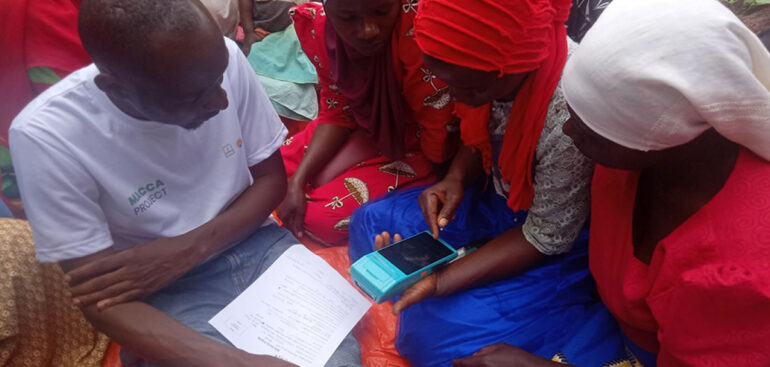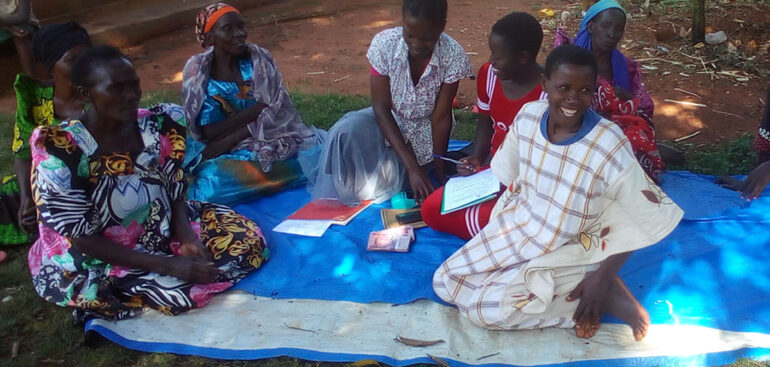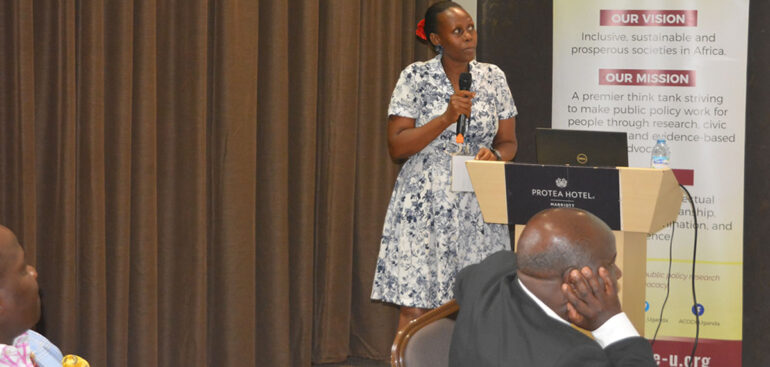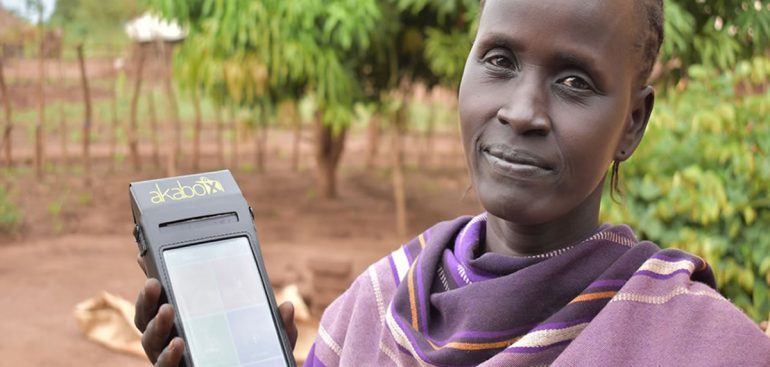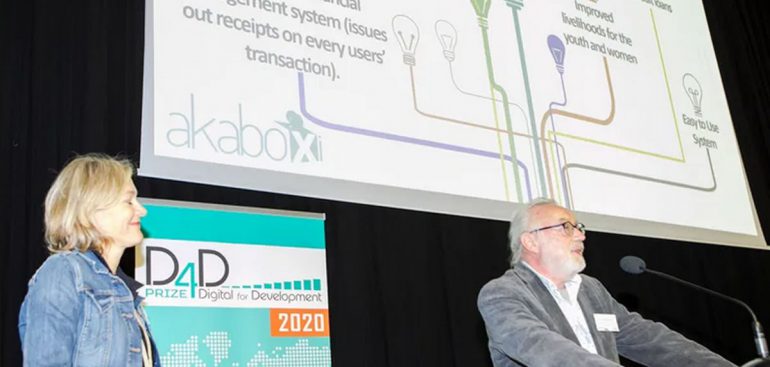Financial inclusion refers to the process of bringing unbanked and under-banked individuals and communities into the formal financial system, allowing them to access financial services such as savings and loans.
Akaboxi is a digital financial inclusion system that enables small holder farmers manage and monitor their savings together. Akaboxi works with the existing Village Savings and Loan Association groups (VSLAs) and creates new ones wherever they do not exist.
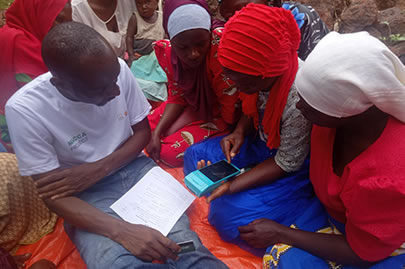
Akaboxi enables the unbanked, the vulnerable women and unemployed youths in rural communities access cheap and affordable finance for their small businesses, access to ready markets for their produce. This is done using the Akaboxi technology for transparency of the farmers savings and other transactions during the weekly meetings.
The digital financial inclusion ecosystem in Uganda has seen significant growth in recent years, with several players entering the market to provide various financial services to underserved populations. Here are some of the major competitors of Akaboxi in Uganda’s digital financial inclusion ecosystem:
MTN Mobile Money: MTN Mobile Money is one of the most popular mobile money services in Uganda, with over 12 million registered users. The service allows customers to send and receive money, pay bills, and purchase airtime using their mobile phones.
Airtel Money: Airtel Money is another popular mobile money service in Uganda, offering similar features as MTN Mobile Money. The service has over 9 million registered users and is supported by a network of agents across the country.
Uganda Microfinance Limited (UML): UML is a microfinance institution that provides loans and other financial services to underserved communities in Uganda. The institution has recently launched a digital platform that allows customers to access its services online.
Opportunity Bank: Opportunity Bank is a commercial bank that offers a range of financial products and services, including savings accounts, loans, and insurance. The bank has a strong presence in rural areas of Uganda, where access to formal financial services is limited.
Equity Bank: Equity Bank is a Kenyan-based bank that has expanded its operations to Uganda. The bank offers a range of financial products and services, including mobile banking, online banking, and loans.
Beyonic: Beyonic is a mobile payments platform that enables businesses and organizations to make and receive payments from customers and partners. The platform is specifically designed for the needs of small and medium-sized enterprises (SMEs) in emerging markets.
SafeBoda: SafeBoda is a ride-hailing platform that has recently expanded into the financial services space. The platform offers a range of financial products and services, including loans and insurance, to its drivers and customers.
These are just some of the major competitors in Uganda’s digital financial inclusion ecosystem. With the continued growth of digital financial services in the country, it is likely that more players will enter the market in the coming years.
Akaboxi has performed tremendously well to reach out to the unbanked, the vulnerable in rural communities.
Akaboxi Limited Company is different in that Akaboxi tech system is customized for its AKABOXI clients, taking financial services directly to the vulnerable groups at the grass root in rural communities that are financially excluded from accessing finance from formal financial institutions. These small holder farmers own the software system together with the devices. We offer a full package that enables farmers to be equipped for increased productivity through credit scoring, record keeping, agricultural input provisions, trainings in finance and smart agriculture and creation of jobs in agricultural and small and medium enterprises with an accelerator model and multiplier effect in communities. Our market share is 100% to date. Formal financial institutions like SACCOs, Microfinance institutions, commercial banks and mobile money platforms that offer digital financial inclusion services only work on individuals and groups that can afford to fulfil conditions of traditional commercial banking like provision of collaterals, minimum account balances, credit scoring, bookkeeping. This is still a hinderance to financial inclusion for such vulnerable population. Akaboxi has established a model for completing the VSLA model in a bide to extend financial services to the vulnerables. We have started a small holder farmers bank in Kyarushesha village 84 KMs from Hoima town on L.Albert to enable the vulnerable women and unemployed youth access all financial products at a one stop centre.
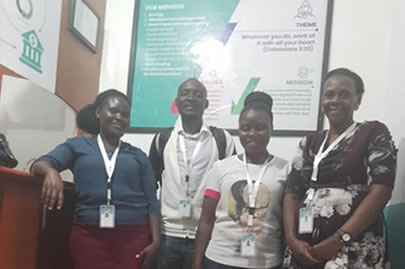
Social/Cultural
The Akaboxi project has improved a culture of saving. People in Akaboxi save as groups of at least 30 individuals. In addition, the community has had other opportunities like sharing information on markets, weather changes, agricultural inputs, best farming practices and creation of a network of farmers with local and international markets.
Technological. This technology replaces the rudimentary way of keeping money in boxes and in people’s homes to a more secure reliable and easy to use the system. The system provides a credit scoring model that enables members in the saving groups to accurately and efficiently assess the credit risk of their colleagues and be able to manage and monitor their savings. Every individual member in the savings group is assigned a unique Identity Card (ID) for clear identification capturing the necessary demographic information. The ID card is embedded with Near Field Communication (NFC) technology that is used for transactions during saving and borrowing of money. The system is also linked to each member’s mobile money phone number which they can use to withdraw money from any mobile money outlet in their location. The Akaboxitech system issues out a receipt to every small holder farmer within the group for every transaction carried out for transparency purposes and trust.
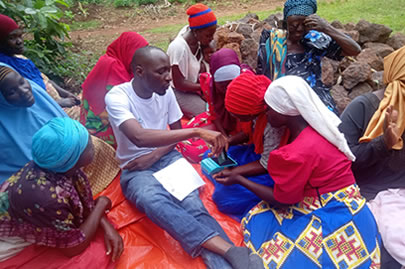
Behavioural characteristics
The women and men value the product, technology and are loyal (loyalty) and the youth have zeal.
Environmental
Akaboxi impact objective in the ecosystems is to have a sustainable land management for households in VSLAs. This is measured by the area of trees on which they are planted per year and the number of tonnes of the briquettes produced by the vulnerable women and youths in rural communities per quarter.

